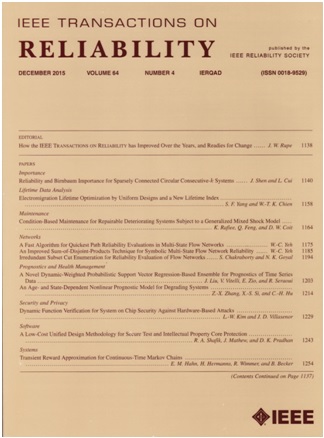回归和时间序列混合方法预测系统性能和评估弹性
IF 5.7
2区 计算机科学
Q1 COMPUTER SCIENCE, HARDWARE & ARCHITECTURE
引用次数: 0
摘要
弹性工程是设计、构建和维持系统的能力,这些系统可以有效地处理破坏性事件。以前的研究主要集中在弹性模型上,这些模型不是用来预测多次中断和恢复的,而弹性指标通常是在中断后计算的。因此,本文介绍了一种结合回归和时间序列方法来跟踪和预测多重冲击下系统性能的新方法,为规划弹性测试和指导适用于各种系统和过程的数据收集提供了框架。为了说明这一点,从1980年美国经济衰退的历史失业数据集的50%到80%的子集被用于模型拟合,以评估泛化和稳定性。拟合优度测量、置信区间和弹性指标通过既定的统计方法和神经网络模型验证了该方法。结果表明,当拟合小数据集时,传统的统计模型无法捕捉微小的变化,而神经网络对训练数据的大小过于敏感。相比之下,考虑即时和延迟中断的新型混合方法在预测弹性指标方面表现出卓越的长期预测性能和更高的准确性,即使只有50%的数据用于模型拟合。本文章由计算机程序翻译,如有差异,请以英文原文为准。
Regression and Time Series Mixture Approaches to Predict System Performance and Assess Resilience
Resilience engineering is the ability to design, build, and sustain systems that can deal effectively with disruptive events. Previous research focused on resilience models that were not designed to predict multiple disruptions and recoveries, and resilience metrics, which are typically calculated after disruptions. Therefore, this article introduces a new approach combining regression and time series methods to track and predict system performance under multiple shocks, offering a framework for planning resilience tests and guiding data collection applicable to various systems and processes. To illustrate, subsets ranging from 50% to 80% of a historical job loss dataset from the 1980 U.S. recession were used for model fitting to assess generalization and stability. Goodness-of-fit measures, confidence intervals, and resilience metrics validated this approach against established statistical methods and a neural network model. The results indicate that traditional statistical models fail to capture minor changes when fitted with small datasets, and neural networks are overly sensitive to the size of the training data. In contrast, the novel mixture approach considering immediate and delayed disruptions exhibits superior long-term predictive performance and greater accuracy in forecasting resilience metrics, even when only 50% of the data is used for model fitting.
求助全文
通过发布文献求助,成功后即可免费获取论文全文。
去求助
来源期刊

IEEE Transactions on Reliability
工程技术-工程:电子与电气
CiteScore
12.20
自引率
8.50%
发文量
153
审稿时长
7.5 months
期刊介绍:
IEEE Transactions on Reliability is a refereed journal for the reliability and allied disciplines including, but not limited to, maintainability, physics of failure, life testing, prognostics, design and manufacture for reliability, reliability for systems of systems, network availability, mission success, warranty, safety, and various measures of effectiveness. Topics eligible for publication range from hardware to software, from materials to systems, from consumer and industrial devices to manufacturing plants, from individual items to networks, from techniques for making things better to ways of predicting and measuring behavior in the field. As an engineering subject that supports new and existing technologies, we constantly expand into new areas of the assurance sciences.
 求助内容:
求助内容: 应助结果提醒方式:
应助结果提醒方式:


